Key takeaways:
- Fair fees should reflect the value of services provided and prioritize transparency to build trust between clients and service providers.
- Negotiating fair fees involves open communication, clarity on expectations, and empathy, leading to arrangements that satisfy both parties.
- Adopting fair fee practices not only fosters motivation for service providers to deliver high-quality work but also elevates industry standards and enhances customer experiences.
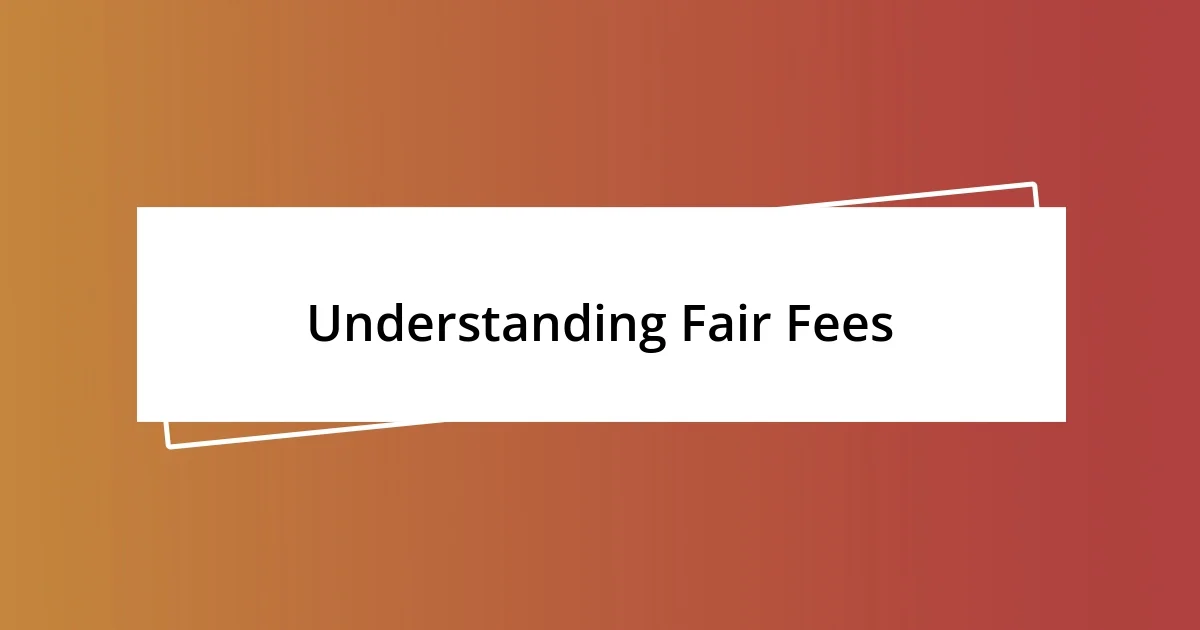
Understanding Fair Fees
Understanding fair fees can sometimes feel like navigating a maze. I remember when I was charged unexpected fees for a service I thought was straightforward. It left me wondering, what exactly constitutes a fair fee? To me, fair fees should reflect the value provided, and transparency is key.
I often think about the relationship between cost and quality. Have you ever felt hesitant to pay a fee, only to later realize the value you received far outweighed the charge? I’ve encountered situations where a seemingly high fee led to exceptional service, leaving me reassured that it was indeed a fair exchange.
One thing I’ve come to appreciate is that fair fees not only cover costs but also promote respect and trust between the service provider and the client. When I can see where my money is going, it builds my confidence. Isn’t it satisfying to know that you’re being treated fairly?
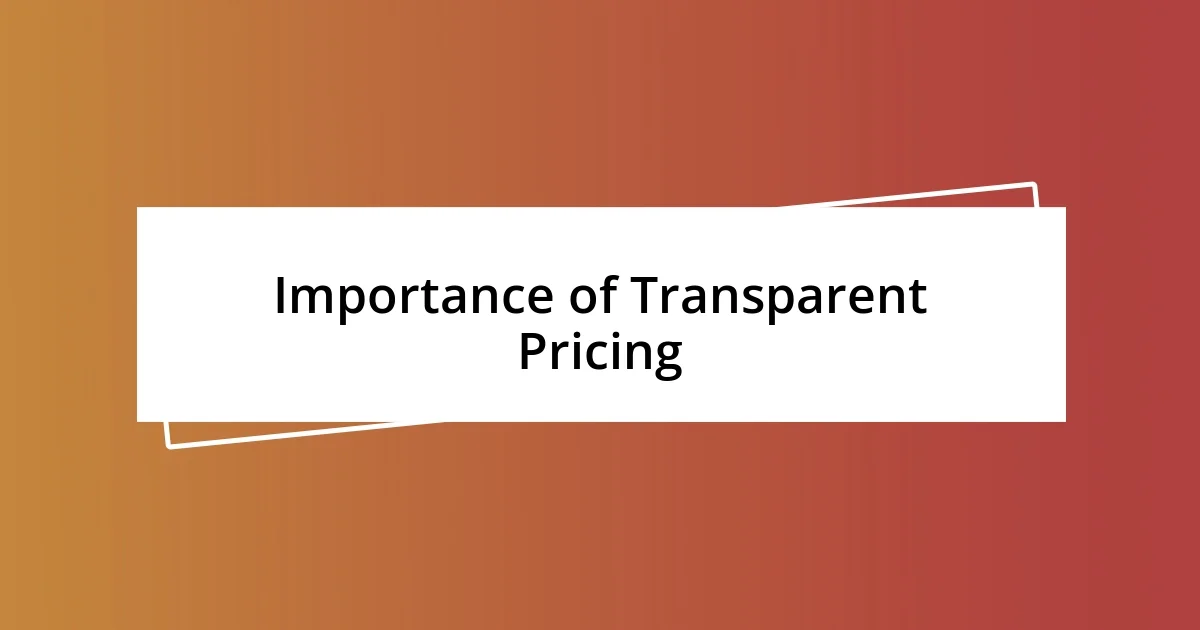
Importance of Transparent Pricing
Transparent pricing is crucial for building trust. I recall a situation where I initially hesitated to engage a new service because their fees weren’t clearly laid out. Once I found a breakdown of their pricing structure, it eased my concerns and I felt more confident in my decision. Have you ever experienced something similar? It’s that clarity that can turn uncertainty into trust.
Moreover, when prices are transparent, clients are empowered to make informed decisions. I remember a time I chose a vendor solely based on the clarity of their pricing model. I felt confident in my choice and appreciated the honesty of their approach. This experience taught me that transparent pricing isn’t just about fees; it’s about enabling me as a consumer to feel in control.
A clear pricing structure also enhances customer satisfaction. I’ve experienced both hidden fees and transparent pricing, and the latter left me feeling valued. When companies openly share their pricing, it signals respect for their clients, creating a positive relationship. Who wouldn’t want to work with someone who shows they value your trust?
| Aspect | Transparent Pricing |
|---|---|
| Customer Trust | Increases |
| Consumer Empowerment | Enhances decision-making |
| Customer Satisfaction | Improves with clarity |
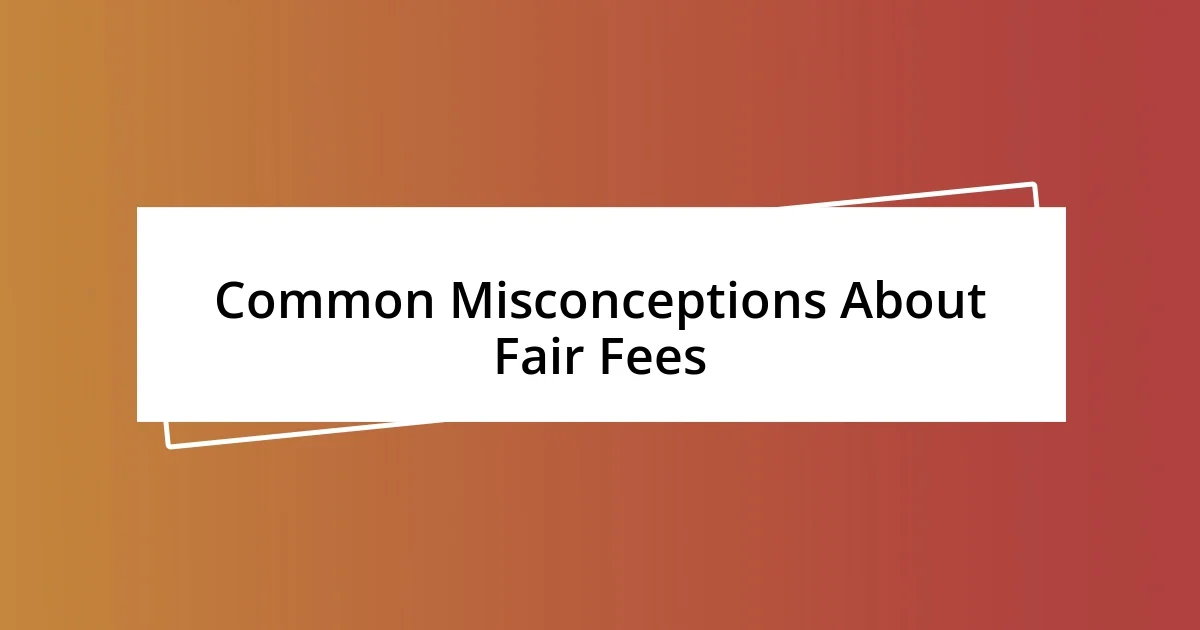
Common Misconceptions About Fair Fees
There are several myths surrounding what constitutes fair fees that can cloud our judgment. One common misconception is that a higher fee automatically means better service. I vividly recall a time when I opted for a budget-friendly option, only to receive outstanding service that far surpassed pricier providers. It was a humbling experience that taught me that true value doesn’t always correlate with cost.
- Fair fees equate to better service.
- Hidden fees are always intentional.
- Discounts mean lower quality.
- All clients should have the same fee structure.
- Fair fees should always match market rates.
Another point of confusion is the belief that all fees should be identical across the board. I once believed that just because two businesses offered similar services, their fees should also be alike. When I started exploring independent providers, I found varied pricing that made total sense based on their unique offerings and expertise. It reinforced my understanding that fair fees are individualized and reflective of particular circumstances.
- Pricing can vary based on expertise and offerings.
- Location influences fair pricing.
- Service complexity can justify different fee structures.
- Value perception differs per customer.
- Fair fees can fluctuate based on supply and demand.
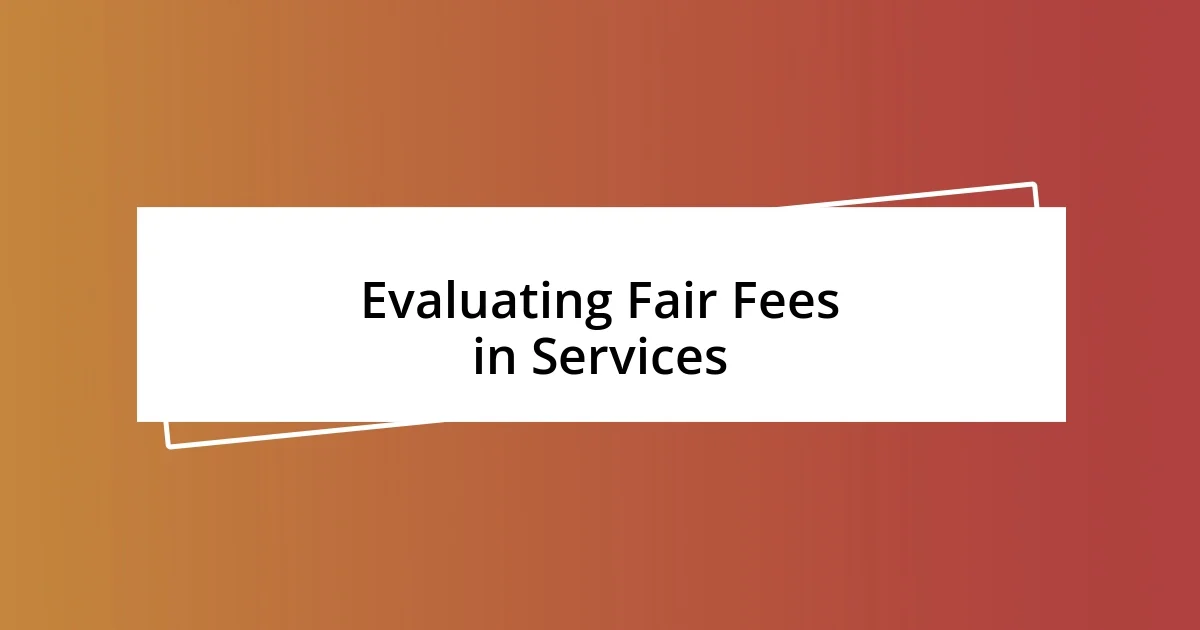
Evaluating Fair Fees in Services
When I think about evaluating fair fees, I realize it really comes down to understanding what you’re getting for your money. A couple of years ago, I hired a consultant whose fees were on the higher side. Initially, I felt a twinge of regret as I handed over the check. But that feeling quickly vanished when I saw the depth of insight I received. The value I gained was far beyond the price tag, highlighting how services should be assessed on their tangible impact rather than just their cost.
Analyzing what makes fees fair also invites a closer look at the ever-important concept of value. Have you ever worked with a service provider who seemed disconnected from your needs? I remember engaging with someone whose fees were competitive, but the service was so generic it left me disappointed. In contrast, paying a little more for a service that felt tailored to me not only justified the fee but left me with lasting satisfaction. This lesson taught me that fair fees should reflect both the quality of the service and the level of personalization involved.
Another critical aspect is the comparison of service offerings. I once made the mistake of choosing a service based solely on the pricing structure rather than the potential value it was meant to deliver. I learned the hard way that lower fees can sometimes result in subpar experiences. So, what does this mean for evaluating fair fees? It’s essential to weigh the benefits against the costs and remember that sometimes investing a little more upfront can lead to greater satisfaction and better outcomes down the line.
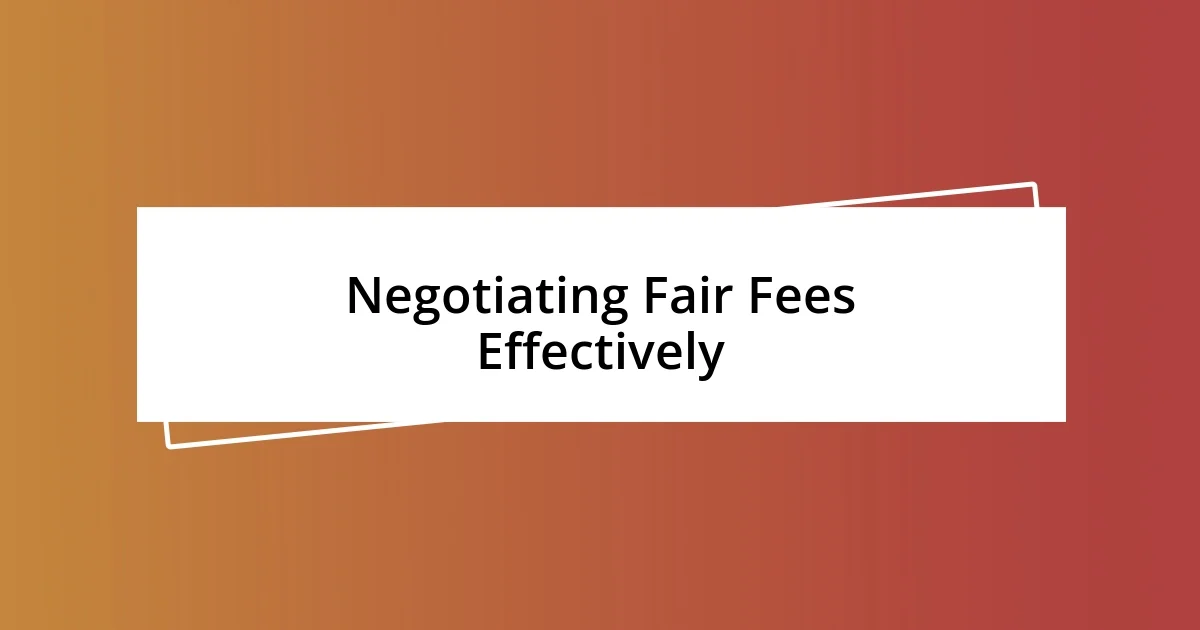
Negotiating Fair Fees Effectively
Negotiating fair fees effectively often hinges on open communication. I recall a recent experience where I approached a freelance graphic designer about their pricing. Instead of simply accepting the quote at face value, I chose to discuss the scope of my project and express my budget constraints. To my surprise, the designer was willing to adjust the fee after understanding the value I placed on their work. It reinforced my belief that honesty in discussions can lead to mutually beneficial arrangements.
Having clarity on your needs also plays a crucial role in these negotiations. When I was looking to hire a marketing consultant, I outlined specific outcomes I hoped to achieve. This not only helped me convey my expectations but also streamlined the conversation about fees. The consultant appreciated my direct approach and we ultimately established a fee structure that honored both the work involved and the results I expected. It’s a reminder that negotiating fair fees is often about being well-prepared.
Additionally, I’ve learned the importance of empathy in negotiations. I once faced a situation where a service provider was firm on their pricing, but I took a moment to understand their perspective. I shared my own budget limitations and they reciprocated by offering alternative packages that fit my needs without compromising quality. This experience highlighted that effective negotiations are not just about numbers but about building a rapport that allows both parties to walk away feeling satisfied.
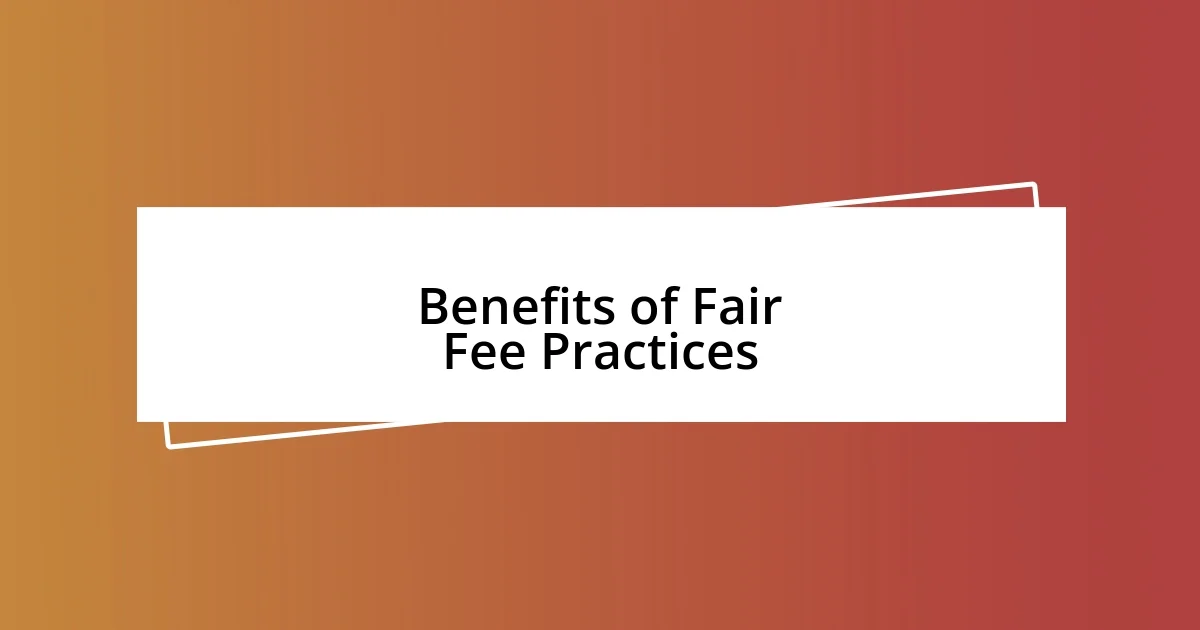
Benefits of Fair Fee Practices
Fair fee practices foster trust between clients and service providers. I remember when I chose to work with a financial advisor whose fees were clear and justified by their expertise. Knowing exactly how much I would pay and what services I would receive helped me feel secure in my investment. This transparency not only strengthened my confidence in their abilities but also made me more willing to engage deeply in our financial planning discussions.
Another remarkable benefit of fair fee practices is the motivation it creates for service providers to deliver top-notch service. There was a time when I contracted a photographer for a special event, and their fees were mid-range yet reasonable. The quality of their work truly exceeded my expectations. I believe that when professionals feel fairly compensated, they are more motivated to go the extra mile, ensuring that clients receive excellent service and results.
Lastly, adhering to fair fee practices promotes a better industry standard overall. Have you ever found yourself annoyed by hidden fees and misleading pricing? I have, and it leaves a sour taste! When more service providers adopt fair fee structures, it sets a precedent that encourages others to follow suit. This kind of ethical approach not only elevates the quality of services offered but also enhances the overall customer experience, creating a healthier marketplace where everyone benefits.

Real-World Examples of Fair Fees
When I think about fair fees, one real-world example that stands out is my experience with a local handyman. I had a small home repair that seemed daunting to tackle myself. After getting a quote, I realized it felt a bit high for the job at hand. Instead of just accepting it, I discussed what the task entailed and shared my concerns. The handyman took the time to explain the costs behind his services, and together we agreed on a fair price that met both my budget and his need for compensation. This conversation not only made me feel valued, but it also showed him that I appreciated his expertise.
Another instance that resonates with me is my search for a personal trainer. I initially encountered a range of fees, and honestly, some were outrageous! However, I met one trainer who was transparent about her pricing and offered sliding scale options for different packages. This gesture made me feel respected and understood. The connection that developed from honest conversations about both her needs and mine created a sense of partnership that motivated me to commit to the sessions. Have you ever felt more invested in something because the pricing felt fair and straightforward? I know I did!
One more memory that lingers is when I hired a website designer. I reached out to a few, but one stood out because of her willingness to break down her fee structure. As we chatted, she made me realize that fair fees often reflect the time, creativity, and expertise required for a project. She shared how she determined her fees with a careful consideration of the unique needs of each client. I found that honestly reflecting on her worth inspired confidence in her abilities and our future collaboration. It made me think about how important it is for service providers to feel empowered to present their work with appropriate compensation. Wouldn’t you agree that recognizing that value fosters a better working relationship?














